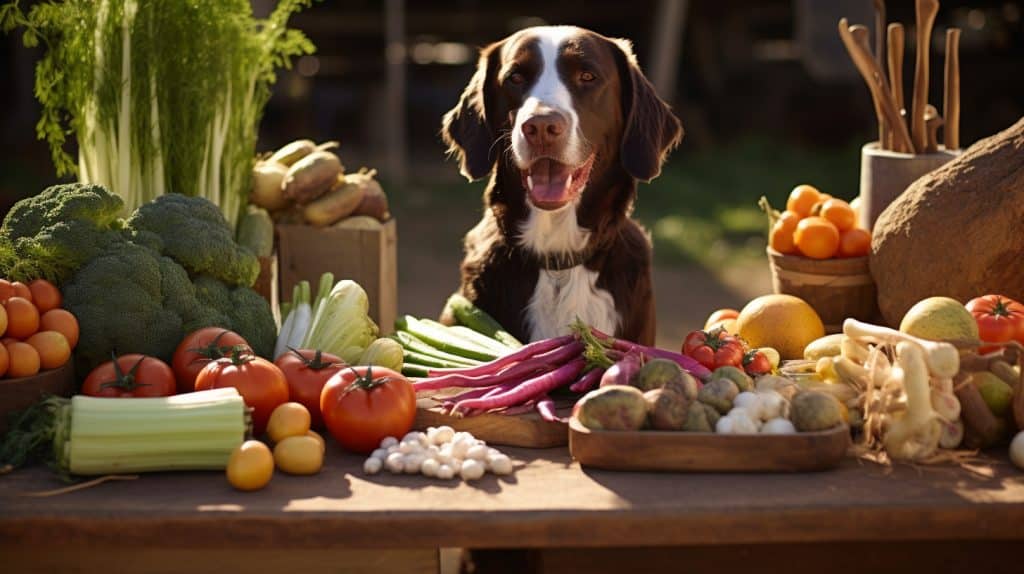What is Natural Dog Food?
It's natural to want the best for our furry friends, and a key part of their well-being is their diet. But what is natural dog food?
Let's explore the world of natural dog food together and discover how it can help keep your pup happy, healthy, and full of energy!

Key Takeaways:
- Natural dog food uses ingredients derived from nature, like whole meat, poultry, fish, vegetables, and whole grains, going through minimal processing to maintain their nutritional value.
- Benefits of natural dog food may include improved digestion, shinier coat, increased energy levels, and potentially reflecting a species-appropriate diet for dogs.
- Consulting your veterinarian before switching your pet's food is crucial to ensure it aligns with your dog's specific needs and health conditions.
- While natural dog food offers exciting possibilities, more research is needed to definitively prove its superiority over other well-formulated dog foods.
- There's a wealth of information available online, including resources on popular natural dog food brands and even recipes for creating your own homemade options, to help you find the perfect diet for your dog.
What is Natural Dog Food, Anyway?
Over the last few decades, one factor has shaped the pet food industry more than any other: convenience. These days, many of us struggle to find the time to prepare a nutritious, balanced diet for ourselves, let alone our dogs, so it's no surprise that the demand for complete dog foods has increased by 90% in the last 10 years.
https://www.allaboutdogfood.co.uk
Defining Natural Dog Food
One way to define what is natural dog food is to look at the ingredients. Natural dog food uses whole meat, poultry, fish, vegetables, and whole grains with minimal processing and no artificial colors, flavors, or preservatives to maintain their nutritional value.
Debunking Common Myths
The idea that natural dog food is only for pet owners with deep pockets is a common myth. In reality, natural food can be accessible and affordable, especially when considering the potential health benefits it may provide for your furry friend.
How Processed Foods Affect Your Dog's Health
You may not realize it, but the processed foods commonly found in many commercial dog foods can have a negative impact on your furry friend's health (LSI term). These foods often contain artificial colors, flavors, and preservatives, which can be tough on your dog's digestive system and overall well-being.
The Benefits of Feeding Your Dog Naturally
Feeding your dog natural food, like whole meats, vegetables, and grains (LSI terms), can have a multitude of benefits for their health and happiness. Natural proteins and fats can lead to a shinier coat, increased energy levels, and improved digestion, all of which contribute to a healthy and active pup.
What Makes Natural Dog Food So Special?

Whole Foods vs. Processed Ingredients
Now, what makes natural dog food stand out is its emphasis on whole foods over processed ingredients. Ingredients like whole meat, poultry, fish, vegetables, and whole grains provide crucial nutrients that are less likely to be lost during minimal processing, ensuring your pup gets the best nutrition possible.
The Role of Preservatives and Additives
Makes natural dog food special is its avoidance of artificial colors, flavors, and preservatives. The absence of these additives allows your furry friend to enjoy a diet that is free from potentially harmful substances, promoting better overall health and well-being.
The Pros and Cons of Natural Dog Food
| Pros | Cons |
| Improved digestion | Potentially higher cost |
| Shinier coat | May not be suitable for all dogs |
| Increased energy levels | Less convenience compared to commercial options |
| Reflects a species-appropriate diet | Requires more research on long-term benefits |
Weighing the Advantages and Disadvantages
Any pet owner considering switching to natural dog food should weigh the potential benefits against the drawbacks. While it may lead to improved digestion, a shinier coat, increased energy levels, and align with a species-appropriate diet, it's vital to consider the higher cost, potential suitability issues, convenience factors, and the need for further research on long-term benefits.
Meat, Fish, and Poultry: The Protein Powerhouses
Your pup's diet is incomplete without the protein powerhouses – meat, fish, and poultry. These natural sources of protein are vital for your dog's muscle development and overall health. With minimal processing, these ingredients retain their nutritional value and provide the energy your furry friend needs to chase their tail all day long!
Fruits, Vegetables, and Grains: The Nutrient-Dense Trio
One key aspect of natural dog food is the inclusion of fruits, vegetables, and grains in the mix. This trio packs a punch when it comes to vital nutrients like vitamins, minerals, and fiber. These ingredients not only support your dog's digestion but also contribute to a shiny coat and increased energy levels, keeping your furry friend happy and healthy.
Reading Labels Like a Pro
Your first step in choosing the best natural dog food is to carefully read and understand the ingredients listed on the label. Look for whole foods like meat, poultry, fish, and vegetables, and avoid artificial colors, flavors, and preservatives.
Avoiding Fillers and By-Products
Food fillers and by-products are often used in lower quality dog foods to bulk up the product without providing much nutritional value. When choosing natural dog food, it's important to avoid these fillers and by-products to ensure your pet is getting the best nutrients possible.
The Connection Between Natural Dog Food and Health
Reducing the Risk of Chronic Diseases
Once again, natural dog food comes to the rescue by potentially reducing the risk of chronic diseases in your furry friend. By opting for whole food ingredients with minimal processing and no artificial additives, you're providing your dog with a nutrient-dense diet that may help keep health issues at bay.
What About Raw Food Diets?
The Pros and Cons of Feeding Your Dog Raw
For those considering switching their pet to a raw food diet, it's important to weigh the advantages and disadvantages of this choice. Below are some pros and cons to consider:
| Pros | Cons |
| Enhanced digestion | Potential risk of foodborne illness |
| Improved coat and skin health | Unbalanced diet if not properly formulated |
| Increased energy levels | Difficulty in sourcing quality ingredients |
Safety Precautions and Handling Tips
A crucial aspect of feeding your dog a raw diet is prioritizing safety and proper handling. Ensure your pup's well-being with these precautions:
- Thaw frozen raw food in a refrigerator
- Wash your hands and any surfaces touched by raw food
- Store raw food separately from human food
This will help prevent contamination and ensure your dog's health.
With careful consideration and guidance from your veterinarian, introducing raw food into your dog's diet can be a rewarding choice that aligns with their natural instincts. Always prioritize safety and consult with a professional for personalized recommendations based on your dog's individual needs.
Natural Dog Food vs. Homemade Diets
Weighing the Convenience and Cost Factors
Not sure whether to opt for natural dog food or homemade diets for your furry friend? Consider the convenience and cost factors. Natural dog food can be easily purchased in stores, saving you time and effort in meal preparation. However, homemade diets can be more cost-effective and allow you to control the ingredients your dog consumes.
- The potential benefits of natural dog food may outweigh the convenience of homemade diets.
The key is finding a balance that aligns with your dog's needs and your lifestyle. Consult your veterinarian to determine the best option.
Can Natural Dog Food Help with Allergies and Sensitivities?
Identifying Common Allergens and Intolerances
Keep an eye out for signs like itching, gastrointestinal issues, or even chronic ear infections that may indicate your dog has an allergy or food sensitivity. Common allergens in dog food include grains like corn and wheat, as well as artificial additives such as preservatives and dyes.
Using Natural Ingredients to Soothe Skin and Coat Issues
For pups with skin or coat problems, natural ingredients like salmon oil, coconut oil, and oatmeal can provide relief. These ingredients are known for their anti-inflammatory and moisturizing properties, helping to soothe irritated skin and promote a healthier coat.
Busting the Myth That Natural Dog Food is Too Complicated
On the contrary, preparing natural dog food doesn't have to be complicated at all. While some pet owners may feel overwhelmed by the idea of making their own dog food, there are plenty of simple and nutritious recipes available online.
Many natural dog food brands also offer ready-to-eat options that are easy to incorporate into your pet's diet. Making the switch to natural dog food can be a straightforward and rewarding process for both you and your furry friend.
Tips for Transitioning Your Dog to Natural Dog Food
Always ensure a gradual change over of any long term food. Follow these tips to make the switch as smooth as possible:
- Begin with small amounts of any new food and adding to your dog’s existing meals.
- Slowly increase the ratio of new to old food over a period of 7-10 days.
- Monitor your dog's stool consistency and overall well-being during the transition.
Assume that your dog may take some time to adjust to the new taste and texture of natural dog food. Be patient and adjust as needed to ensure your furry friend is comfortable with the change.
People also ask
What is natural dog food?
Natural dog food refers to food that uses ingredients derived from nature, such as whole meat, poultry, fish, vegetables, and whole grains. These ingredients undergo minimal processing to preserve their nutritional value and do not contain artificial colors, flavors, or preservatives.
What are the potential benefits of feeding my dog natural food?
Feeding your dog natural food can lead to improved digestion, shinier coat, increased energy levels, and potentially better reflect what dogs evolved to eat. Whole food ingredients are easier for dogs to digest, contributing to better gut health and overall well-being.
Should I talk to my vet about switching my dog to natural dog food?
Yes, it's important to consult your veterinarian before making any significant changes to your dog's diet. They can help determine if natural dog food aligns with your dog's specific needs and health conditions, ensuring a smooth transition and optimal well-being.



